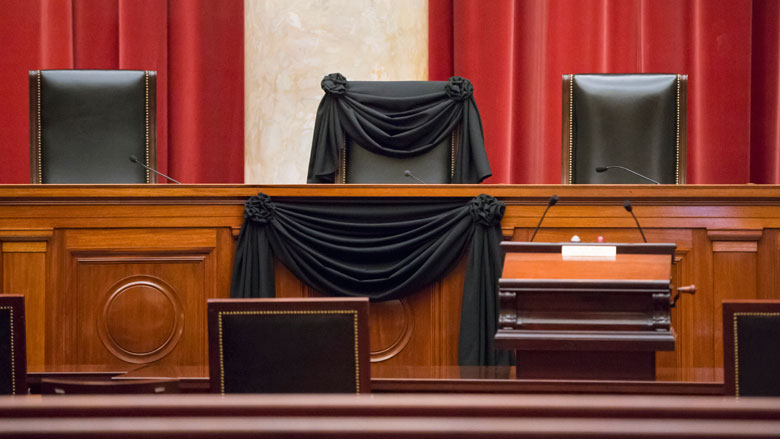On Justice Scalia and the loss of originalism
By Joseph Tortelli | February 18, 2016, 6:20 EST
 Supreme Court Justice Antonin Scalia’s courtroom chair is draped in black to mark his death as part of a tradition that dates to the 19th century, Tuesday, Feb. 16, 2016, at the Supreme Court in Washington. (AP Photo/J. Scott Applewhite)
Supreme Court Justice Antonin Scalia’s courtroom chair is draped in black to mark his death as part of a tradition that dates to the 19th century, Tuesday, Feb. 16, 2016, at the Supreme Court in Washington. (AP Photo/J. Scott Applewhite) In the last half century, the Constitution of the United States has had no more powerful defender than Justice Antonin Scalia. On the bench and off, he has consistently spoken for the principles of jurisprudence most often called originalism and sometimes called textualism.
Scalia’s goal was to interpret the Constitution and its Amendments as close to their original meaning as possible. Holding restraint and humility as essential characteristics of the judicial temperament, he insisted that judges refrain from foisting their own policy preferences upon the American people.
There’s a certain historical irony in this conservative jurist standing for democracy against the rule of the few. Yet there he stood time and again upholding Constitutional principles against those seeking to usurp authority and destroy the federal system that reserves powers to the states or the people.
Born in 1936 during the Depression, “Nino” excelled at Manhattan’s Xavier High School, Georgetown University, and Harvard Law School. After serving in government and teaching law, Scalia was nominated to the United States Court of Appeals for the District of Columbia Circuit by President Ronald Reagan, who had previously added Robert H. Bork to that court.
There was a presumption that Bork was next in line for a U.S. Supreme Court vacancy. But in one of those peculiar swerves in history, Reagan hit it off with the younger and gregarious Scalia, and opted to nominate the first Italian-American Supreme Court Justice. At a time the Republicans controlled the Senate, Antonin Scalia breezed through the hearings and was approved by unanimous vote.
Meanwhile the Democrats took control of the Senate, and Robert Bork’s later nomination ran into a buzz-saw, when Senator Ted Kennedy took to the floor of the Senate to warn voters about what life supposedly would be like in “Robert Bork’s America.”
Kennedy’s politically-motivated vilification of Bork serves as a stark reminder that partisanship and incivility have long roamed the halls of Congress. As a result, Bork was denied the opportunity to take his place next to Scalia on the Supreme Court. More to the point, the nation was denied the pairing of the Mantle and Maris or the Koufax and Drysdale of Constitutional thought.
Sitting on the bench since 1986, Scalia was the longest serving member of the current Supreme Court at the time of his passing. In practical terms, his loss will be felt immediately.
Starkly put, the Little Sisters of the Poor will need more than a miracle to get relief from the Scalia-less bench. Under any scenario, it will be impossible for conservatives to muster a majority.
Today, the Court includes four adamant liberals appointed by Presidents Obama and Clinton, while the four justices appointed by Republican presidents remain divided. Clarence Thomas and Samuel Alito are consistent conservatives; Chief Justice John Roberts is an idiosyncratic conservative who twice saved Obamacare, opening a wide target for the dissenting Scalia to coin the term “Scotuscare”; Anthony Kennedy is a singularly shifting moderate, whose vote frequently determines the outcome of cases, leading many to call him the most powerful person in America. That arbitrariness typifies the kind of judicial uncertainty and overreach that Scalia spent a lifetime arguing against.
For the foreseeable future, conservatives can look only with dread or wariness upon the bleak legal landscape. In cases that pit conservatives against liberals, the most conservatives can hope to achieve is an indecisive 4-4 tie. That will leave appeals court rulings temporarily in place, jeopardizing the Little Sisters of the Poor, for example. Such 4-4 cases would surely have been tipped in a 5-4 conservative direction with Scalia’s vote. When Kennedy or Roberts joins the liberals, the court will tilt decidedly leftward. For liberals, the new reality becomes “heads we win, tails you lose.”
This is a far cry from the anticipation that greeted Scalia’s tenure on the court. Reagan was President. William Rehnquist, the conservative precursor to Scalia, became Chief Justice. It seemed only a matter of time before originalism or textualism became the dominant strain in court rulings.
But it was not to be. Republican presidents made some dubious or wishy-washy choices to fill court vacancies. Meanwhile, Democrat presidents pleased their liberal base with ideologically pure, litmus-test jurists. Despite Scalia’s brilliance and adherence to originalism, he never sat on a court that boasted a dependable conservative majority. He will likely be best remembered for writing the landmark 2008 Heller decision upholding Second Amendment rights of law-abiding gun owners. Yet, he never managed to overturn or even significantly blunt the reach of Roe v. Wade. Nothing better illustrates the frustration of the Scalia years than this: Shortly before his nomination, the court upheld a state’s longstanding legal authority with respect to homosexual activity; during his final term, the court ruled that same-sex marriage was a Constitutional right in all 50 states. Scalia and originalism lost decisively. Arguing that such policy matters belonged to the states and the people, Scalia wrote in his dissent to the 2015 Obergefell decision: “A system of government that makes the People subordinate to a committee of nine unelected lawyers does not deserve to be called a democracy.”
In the face of such disappointments, Scalia continued to influence conservative legal thought and to write witty and caustic dissents. Delivering the inaugural address for the Robert H. Bork Memorial Lecture at Georgetown Law in October 2013, Justice Scalia said, “Originalism is not perfect. It does not overcome the human frailties that inevitably plague all efforts at judging. But it is the best we have….”
A devout Catholic and father to nine children, Scalia may have been referencing his belief in the archetypal originalism: Original Sin. That doctrine cautions against the perfectibility of any person, no matter how putatively wise or exceptional. It echoes the caution Scalia raised for decades about putting one’s faith in “nine unelected lawyers.”
Joseph Tortelli is a freelance writer. Read his past columns here.











